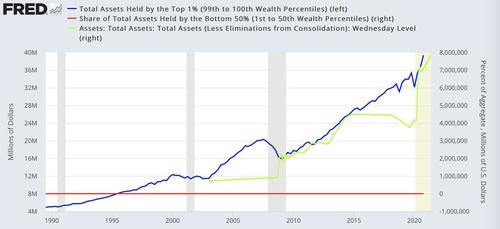Druckenmiller: “There’s Been No Greater Engine Of Inequality Than The Fed”
After his status-quo-shattering appearance on CNBC this week, during which he warned that “Fed policy is endangering the dollar’s reserve status,” billionaire fund manager Stan Druckenmiller spoke to The USC Marshall Center for Investment Studies’ Student Investment Fund Annual Meeting via Zoom, and shocked the on-lookers with his frank assessment of our current perceptions and realities.
After The Bank of Canada sheepishly admitted this week that “some of the monetary policy tools it is using to address the COVID-19 pandemic, such as quantitative easing (QE), could widen wealth inequality,” Druckenmiller drops the proverbial hammer on all the hedged-speak (“could”), and blasts that
“I don’t think there has been a greater engine of inequality than the Federal Reserve Bank of the United States… so hearing the Chairman [Powell] talking about visiting homeless shelters is very rich indeed…”
The outspoken fund manager went on to note that “everyone wealthy that I know is making fortunes” because “this guy [Powell] is printing money like there’s no tomorrow” adding that the kids is Harlem are not benefitting from money-printing but wealthy people are, exclaiming that
“…for the life of me I can’t understand why the left is so excited about money-printing when all the data shows that the people who benefit from money-printing are rich people.”
“The odds-on bet is that we’re going to have inflation,” he continues:
“and inflation is going to hurt poor people, again, a lot more than rich people.”
How does this all end?
“The asset bubble which [Powell] is blowing up into unbelievable proportions busts before the inflation ever really manifests itself, that’s what happened in the housing bubble in 08/09. We never really got to the inflation because the asset bubble burst… not dis-similar to what happened in 1929.”
And Druck reminds us all, “there is no one, no group, that will be hurt more by a bust than the poor… they will be first in line to get screwed.”
Here’s the clip. This is epic. pic.twitter.com/TRg49e47wG
— Rudy Havenstein, cloud-based digital disruptor. (@RudyHavenstein) May 16, 2021
Can’t believe it’s true? Take a look…
While publicly glorified by the media as “heroes” and “saviors” of the economy, Sven Henrich pointed out earlier that the true impact of Fed policy is much more sinister.
Inflation, as Druckenmiller rightly points out hurts the poor the most as living expenses take up most if not all of their monthly budgets.
Watch the full Druckenmiller discussion here.
This revelation to some (not all) came after his earlier-in-the week, WSJ Op-Ed that “keeping emergency settings after the emergency has passed carries bigger risks for the Fed than missing its inflation target by a few decimal points. It’s time for a change.”
Pointing out, rather awkwardly that The Fed’s independence is supposed to act as a counterbalance to these political whims.
“America’s deep divisions also make the central bank’s independence crucial. Fighting inequality and climate change are very far from the Fed’s central mission.”
The long-term risks from asset bubbles and fiscal dominance dwarf the short-term risk of putting the brakes on a booming economy in 2022.
“If they want to do all this and risk our reserve currency status, risk an asset bubble blowing up, so be it. But I think we ought to at least have a conversation about it,” Druckenmiller said.
“If we’re going to monetize our debt and we’re going to enable more and more of this spending, that’s why I’m worried now for the first time that within 15 years we lose reserve currency status and of course all the unbelievable benefits that have accrued with it,” he added.
Central banks have been the root of a lack of confidence in dollar stability.
“5-6 years ago I said Crypto was the solution in search of a problem. That’s why I didn’t play crypto the first wave because we already have the dollar, why do we need crypto for?
The problem has been clearly identified. It is Jerome Powell and the rest of the world’s central bankers. There is a lack of trust.“
Druckenmiller is not alone in his acknowledgement that The Fed is at the heart of driving wealth inequality in America as even left-leaning Mark Zandi, chief economist of Moody’s Analytics, admitted:
“The low-interest environment increases inequality by increasing the wealth of people who are well off.”
As ProPublica reports, economists are beginning to view the interplay of the Fed’s actions and inequality in a new light. Central bankers used to think that “we didn’t have to worry about inequality when we did monetary policy,” Olivier Blanchard, former director of research for the International Monetary Fund, said during a December virtual forum sponsored by the Peterson Institute for International Economics. Blanchard said he has since come to believe that monetary policy does impact economic inequality because a change in interest rates has “major, major distribution effects between borrowers and lenders, between asset holders and not.”
“Inequality is a cumulative process,” said Karen Petrou, author of “The Engine of Inequality: The Fed and the Future of Wealth in America” and managing partner of the Washington-based consulting firm Federal Financial Analytics.
“The richer you are, the richer you get, and the poorer you are, the poorer you get, unless something puts that engine in reverse,” she said.
“That engine is driven not by fate or by untouchable phenomena such as demographics but most importantly by policy decisions.”
Bernanke, currently a fellow at the Brookings Institution, admitted in a 2017 Brookings paper that:
“all else equal, higher stock prices mean greater inequality of wealth.”
Janet Yellen, now Treasury secretary, asked in a 2014 speech whether income inequality is “compatible with values rooted in our nation’s history,” but she largely defended ultra-low rates during a Q&A at a 2013 conference of business journalists.
Older savers were “suffering from low returns on their CDs,” she said, but “they have children and they have grandchildren” who will benefit from the stronger economy.
Except, as Druckenmiller began this diatribe, as the Fed pumps more money into the financial system by buying Treasury securities and indirectly supporting federal stimulus programs, the run-up in stock markets is likely to continue – and leave people even further behind than they already were.
Glaring and expanding wealth inequality is destructive to society. While there will always be inequality and successful capitalism should rightfully reward those that work hard and come up with great business concepts the artificial exponential enrichment of the few by a “government created agency” (Jay Powell) is not in the purview of the Fed’s mandate.
Tyler Durden
Sun, 05/16/2021 – 18:30
via ZeroHedge News https://ift.tt/3wfHeZ7 Tyler Durden

